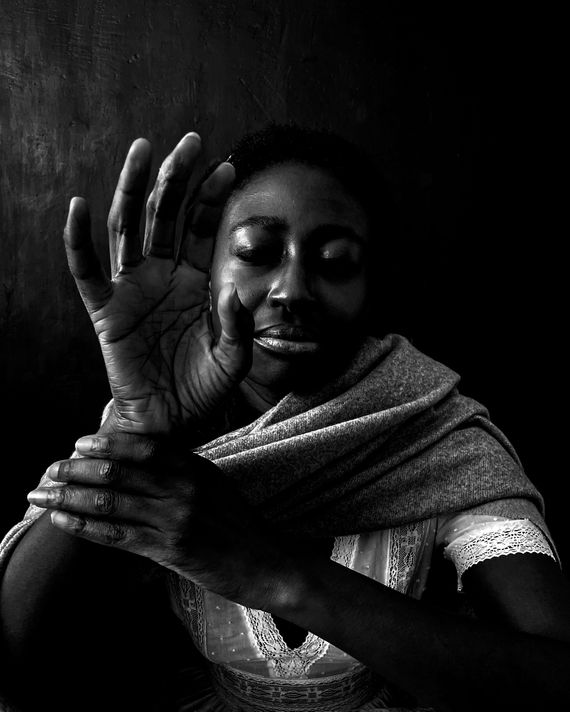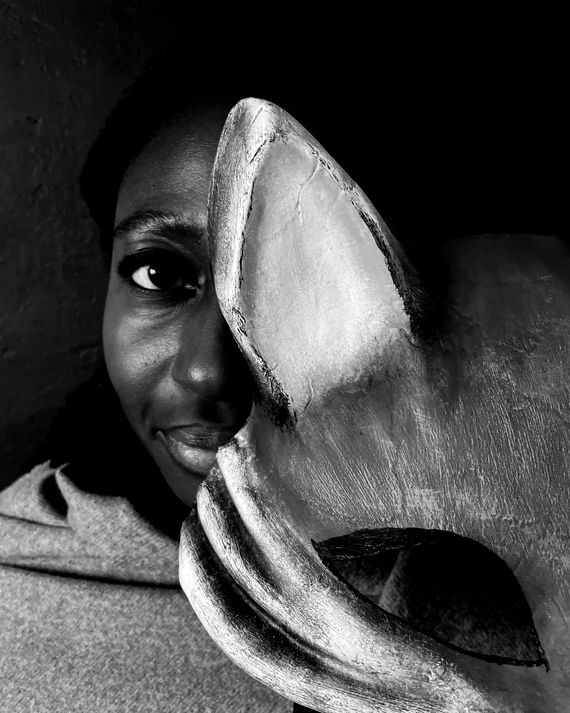
The first story the world told about Helen Oyeyemi was that she was a prodigy. A South London girl who had emigrated from Nigeria at the age of 4, she was inward-keeping, sometimes bullied, often desperately sad. As a teen, she endured bouts of clinical depression that she countered with books from the library, episodes of Buffy the Vampire Slayer, and, eventually, writing. When she was about 15, she read a perfect book. “I stayed home from school,” she told me. “I was ‘off sick’ for three days in bed reading Ali Smith’s Hotel World and just being like, This is allowed? I can’t believe this. I immediately wanted to try it.” Reading was an intense, isolated, even isolating experience. “That’s what made it feel like it was my lifeblood or my own heartbeat,” she said. “It just couldn’t be discussed.”
She wrote short stories throughout her adolescence and sent her strongest one to an agent, looking for advice. He called her the next day. In about six months, at age 18, Oyeyemi wrote The Icarus Girl, an accomplished novel about an 8-year-old whose paranormal not-quite twin from Nigeria starts to wreak havoc. She signed her book contract on the day she got her A-level exam results; the book was published in 2005, while she was taking a political-science degree at Cambridge. Reviews were strong, though most of them seemed aware of her youth and the story of her discovery. “Deserving of all its praise, this is a masterly first novel,” wrote Lesley Downer in the New York Times, but only after asking, “Would we think it was as good if we knew nothing about its author?”
Oyeyemi herself is pretty well over talking about this particular story and a little impatient with the press’s obsession with her genesis myth. When I asked about her parents (her mother works for the London Underground; her father is a substitute teacher), she protested, “This sometimes gets dragged into stuff that’s said about me, and I’m just like, ‘Why? I’m 36 now!’ ”
We were speaking via Zoom on a recent Saturday that was bright and chilly — both in Brooklyn, where I live, and in Prague, where Oyeyemi does. The writer, who grew up mostly in the U.K., spent years living all over the globe before landing at last in the Czech Republic, where she has now been settled for an unprecedented seven years. Before ending up in Prague, she was always on the move, and all her books and stories have widely varying climates: Her bracing 2014 book Boy, Snow, Bird is a mid-century retelling of “Snow White” that revolves around a biracial family poisoned by its obsession with passing. Gingerbread (2019) is an immigration picaresque full of brave girls striding confidently into the city, where the witch’s candied house turns out to be a factory. Oyeyemi writes frequently about race and immigration, braiding these issues so tightly into her fable-making that critics rarely seize on them or succeed in pigeonholing her in the typical ways. You can’t help but think of other stories while reading hers, making the experience weirdly dreamlike and personal. In Oyeyemi land, there are more hurried glances and grazing fingertips in bookshops and libraries than in bedrooms.
In April, she puts out her new book, Peaces, a deeply, intoxicatingly romantic novel interrupted by occasional scenes of Benny Hill farce. In it, two men go on their honeymoon on a fabulous train that seems nearly empty — except for the three women who run it and a rather violent and desperate visitor who may be invisible. Some can see him, some can’t. Peaces is elliptical and strange and funny, and despite its Wes Anderson–like setting, it’s a very bleak little cautionary tale. It proposes that failing to grasp someone’s essential self is pernicious and contagious, that we mistake outlines and portraits for bodies and souls. This train story becomes a comedy of manners built around the gravest possible breach of etiquette: refusing, literally, to see someone. “How do you maintain a sane interaction and communication with that unseen person without sort of excommunicating them from humanity in some way?” Oyeyemi asked me.
As a conversationalist and as an author, Oyeyemi is the queen of the sidelong glance, the misdirection, the parable that can be taken two ways. She often seems on the verge of laughter, especially when speaking about things she takes very seriously. She says she has a “three-quarter theory” that she is somehow a fox. (She relates to the way foxes are drawn to humans yet remain solitary, as well as other, more mysterious kinships.) Oyeyemi’s steady output — seven novels and a collection of short stories over nearly two decades — hasn’t seemed to dissuade people from remembering her as young and sprung from nowhere, but she also resists the process of being understood. Myth has taught her that every story changes when the light does. When we started to approach things she would rather not discuss, she laughed and moved swiftly on. She told me she opposes “emotional manipulation” and “distress porn” in her writing, and perhaps this is why her books can contain so much grief and pain without ever growing heavy or even — odd to say — sad. Her answer to trauma, both in her past and in her stories, has often been to dart away. She was this way in every moment of our conversation, a bird on a branch, prepared for flight.
In several of Oyeyemi’s stories and novels, characters experience a kind of selective invisibility: Other people simply “miss” their presence, or mirrors don’t reflect them. Peaces revolves around the mysterious and missable Prem, a man who is either sympathetic and pitiable — Oyeyemi’s description — or totally terrifying, which is how he struck me. I kept picturing something like the demonic Bob from Twin Peaks. “Don’t you feel sorry for him?” she said, laughing as I shuddered. “He’s just trying to assert himself.”
Oyeyemi herself squirms when people, even friends, tell her she’s one thing or another. “I’m just such an avoidant thinker,” she said, “possibly in every social category, but even in literary categories. When people talk to me about what I’ve written and try to tell me what it is, I just can’t understand what they’re saying.” Oyeyemi’s way of conveying the upside-downness of human systems isn’t through the paranoia of Kafka or the dreaminess of García Márquez but her own amused, clear-eyed vision. Sarah McGrath, her editor since her short-story collection, What’s Not Yours Is Not Yours, feels Oyeyemi totally defies categorization and, she said, “naturally perceives things about the world that are not nearly so available to everyone else.”
Oyeyemi has said she is interested in folktales because she is drawn to their “richness as source stories about the strangeness of thought and emotion.” Being interested in folk legends means she is by definition also interested in women in danger. She had a political awakening at university, when she took a class with a feminist criminology professor and learned how male violence can be legally and socially excused — why some acts can be classed as criminal and others as just “being slightly cheeky crimes,” she said. “It was good in terms of story analysis for me.” In 2006, the year after she published her first novel, Oyeyemi was assaulted in a London park. A man approached her as she was reading and asked to sit by her, then asked to put his head in her lap, then started kissing and assaulting her. They were in full view of passersby, none of whom intervened. She kicked her way free. The terror even had the three-step structure of a fairy tale; imagine the wolf trying to gobble you up as Londoners picnic nearby.
Even before the assault, Oyeyemi hadn’t felt at home in London. She wanted to live in a city that wanted her back. So she moved and moved, all through her 20s. After getting her degree from Cambridge, she went to New York for an M.F.A. at Columbia but left after a semester; New York was too confrontational for her, her studies too formal. “I can’t do a rules-based writing program,” she said. “I can’t find something for workshop once a week. My mind was too crooked for it.” She tried Paris and London and Cambridge again, then Budapest and Berlin. She gave each city six months to a year. But having visited Prague, she kept comparing other cities to its mystery, its secrets, its “doubleness.” Finally, Oyeyemi moved to Czechia, and that was it. Her longtime friend Piotr Cieplak, an academic and a filmmaker, said the decision makes sense to him: “I think Helen is a person who should walk on cobblestones.”
Her wandering, and the fear that went with it, became part of her writing discipline. Her novel Mr. Fox, published in 2011, is a metanarrative: An author’s creation comes to life to scold him for killing off his female characters, then begins writing herself. “Mr. Fox in particular was my trying to write through the fear of being a woman and being by myself and the strong possibility of getting murdered,” she said. “I consoled myself by looking at the statistics and seeing that women have been killed by men that they knew. And I was like, Oh, I don’t know any men! But the fear is always there, especially when you’re trying to do something that you want to do on your own. You have to decide how much the fear can restrict you.”
The Icarus Girl, about a bullied young Nigerian girl growing up in London, was close enough to her own experience that Oyeyemi wouldn’t let her parents read it until after it was published. Since then, elements of autobiography have largely vanished from her novels or been transformed past recognition. This doesn’t mean they’re not personal. She started writing the empowering Mr. Fox because she had nightmares writing White Is for Witching; she wrote her often-cozy Gingerbread in an attempt to create “something warm” after the xenophobic Brexit referendum. She hasn’t quite worked out why she wrote Peaces yet. “With the train journey, I’m not interested in the beginning point or the end point,” she said. “And then, in thinking about the kind of journey you can take where it doesn’t really matter where you’re going, it has to be with someone that you love.”
In this way, at least, the book has already done its magic. “When I was writing Peaces, I’d completely given up on meeting anyone,” Oyeyemi said. “I was just kind of like, This is doomed. It’s just not going to happen. But then, quite predictably, after finishing Peaces, I fell for someone. The initial idea [for the book] was to have this couple go on honeymoon and then punish them for being in love because I couldn’t be in love, but it didn’t turn out that way.” Her new partner is an anthropologist (“A wonderful kind of anthropologist!”) and is, fortunately for the relationship, a Praguer.
When the writer was doing her train research for Peaces, she decided to trace the life of Ludwig II of Bavaria, a dreamy introvert sometimes called “the fairy-tale king” who had long been on her mind for obvious reasons. She set out to visit four of his castles. The mission started as a relatively tidy quest and turned into a series of confusions created by her absorption in things other than the intended destination. She got sucked into conversation with other passengers, grew disoriented, almost missed stops. “I didn’t tell anybody I met that I was working on a train book, but traveling between castles, there was a sort of motif of missing the journey due to being audience to other journeys,” she told me.
When Oyeyemi and I spoke, Prague was entering a particularly severe three-week COVID lockdown. Even when she can travel more freely, Oyeyemi isn’t one for wandering aimlessly. She needs outings to be arranged as little quests — whether or not she sticks to them. “She doesn’t really take walks,” said Cieplak. The last time she set a book in the city she was living in was 18 years ago with The Icarus Girl. This year, that will change: She plans to write her first novel set in Prague. “I’m unscared,” Oyeyemi said. “Also I’m so scared. But I think that all I can do is have fun with it. Otherwise, my heart will literally stop beating before I manage to write the first chapter.”
Writing about the place she lives in could challenge her magical formula — her way of looking slantwise, creating her worlds out of her peripheral vision. Getting turned around seems to be at the heart of Oyeyemi’s process. Her friend and fellow author Catherine Chung remembers getting lost with Oyeyemi in the hills outside Karlovy Vary, a spa town near Prague. “We went on this hike, and when we got back, for some reason, the town looked totally different,” Chung said. “I remember a feeling of real disorientation and a moment where I wondered if we’d walked into a different story than we’d started in, like we were in some children’s story together. If I’d been with someone else, it might have frightened me, but because I was with Helen, it felt magical, like anything could happen.” And indeed, how else can you perceive things no one else sees? You have to look at every place as though it’s the wrong one masquerading as the familiar.
*An earlier version of this piece mistitled Oyeyemi’s book, White Is for Witching.




